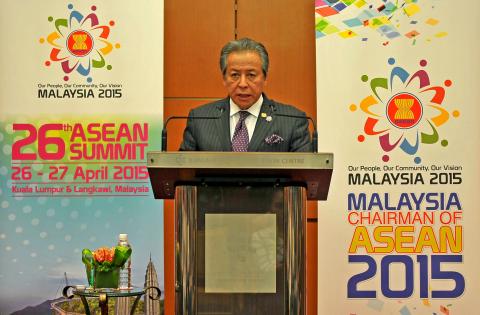Beijing is poised to take “de facto control” of the South China Sea, the Philippines said yesterday, but its call for a robust regional response at a summit was shot down.
Alongside Taiwan, ASEAN members Vietnam, Philippines, Malaysia and Brunei claim parts of the body of water, but Beijing claims almost all of it; its territorial assertions have caused concern in the region and beyond.
“[China] is poised to consolidate de facto control of the South China Sea,” Philippine Secretary of Foreign Affairs Albert del Rosario said in Kuala Lumpur a day ahead of an annual ASEAN summit.

Photo: AFP
He cited land reclamation on disputed reefs that has raised the specter of Chinese bases from which it can enforce its claims.
“Is it not time for ASEAN to say to our northern neighbor that what it is doing is wrong and that the massive reclamations must be immediately stopped?” del Rosario asked his fellow ministers. “Is it not time for ASEAN to finally stand up for what is right?”
However, summit host Malaysia rejected the idea of a response that could antagonize China.
“We must avoid any action that would be counterproductive and bring us further apart, either among ourselves, or with China,” Malaysian Minister of Foreign Affairs Anifah Aman said.
“I do not think ASEAN would like to be given an ultimatum, and by the same token I do not think China would like to be given an ultimatum,” he said.
Faced with Beijing’s immense trade and diplomatic leverage, ASEAN has a history of failing to agree on strong responses over the issue on behalf of its members with disputed maritime claims.
Concern over Chinese land reclamation was reignited this month by satellite photos showing huge amounts of sand being dredged and dumped onto fragile coral reefs claimed by the Philippines.
Defense analysts say these works are creating land masses big enough for airstrips and other facilities, raising the specter of deepening Chinese domination of a vital conduit for much of world trade.
A draft statement prepared well before the gathering began called for “self-restraint” at sea, but avoided direct criticism of China, a diplomatic source said previously.
“ASEAN member-states want to see that this matter should be settled amicably,” Anifah said, adding that he suggested China someday allow joint use of the islands it is constructing.

ACTION PLAN: Taiwan would expand procurement from the US and encourage more companies to invest in the US to deepen bilateral cooperation, Lai said The government would not impose reciprocal tariffs in retaliation against US levies, President William Lai (賴清德) said yesterday, as he announced five strategies to address the issue, including pledging to increase Taiwanese companies’ investments in the US. Lai has in the past few days met with administrative and national security officials, as well as representatives from various industries, to explore countermeasures after US President Donald Trump on Wednesday last week announced a 32 percent duty on Taiwanese imports. In a video released yesterday evening, Lai said that Taiwan would not retaliate against the US with higher tariffs and Taiwanese companies’ commitments to

Intelligence agents have recorded 510,000 instances of “controversial information” being spread online by the Chinese Communist Party (CCP) so far this year, the National Security Bureau (NSB) said in a report yesterday, as it warned of artificial intelligence (AI) being employed to generate destabilizing misinformation. The bureau submitted a written report to the Legislative Yuan in preparation for National Security Bureau Director-General Tsai Ming-yen’s (蔡明彥) appearance before the Foreign Affairs and National Defense Committee today. The CCP has been using cognitive warfare to divide Taiwanese society by commenting on controversial issues such as Taiwan Semiconductor Manufacturing Co’s (TSMC, 台積電) investments in the

HELPING HAND: The steering committee of the National Stabilization Fund is expected to hold a meeting to discuss how and when to utilize the fund to help buffer the sell-off The TAIEX plunged 2,065.87 points, or 9.7 percent, to close at 19,232.35 yesterday, the highest single-day percentage loss on record, as investors braced for US President Donald Trump’s tariffs after an extended holiday weekend. Amid the pessimistic atmosphere, 945 listed companies led by large-cap stocks — including Taiwan Semiconductor Manufacturing Co (TSMC, 台積電), Hon Hai Precision Industry Co (鴻海精密) and Largan Precision Co (大立光) — fell by the daily maximum of 10 percent at the close, Taiwan Stock Exchange data showed. The number of listed companies ending limit-down set a new record, the exchange said. The TAIEX plunged by daily maxiumu in just

‘COMPREHENSIVE PLAN’: Lin Chia-lung said that the government was ready to talk about a variety of issues, including investment in and purchases from the US The National Stabilization Fund (NSF) yesterday announced that it would step in to staunch stock market losses for the ninth time in the nation’s history. An NSF board meeting, originally scheduled for Monday next week, was moved to yesterday after stocks plummeted in the wake of US President Donald Trump’s announcement of 32 percent tariffs on Taiwan on Wednesday last week. Board members voted to support the stock market with the NT$500 billion (US$15.15 billion) fund, with injections of funds to begin as soon as today. The NSF in 2000 injected NT$120 billion to stabilize stocks, the most ever. The lowest amount it